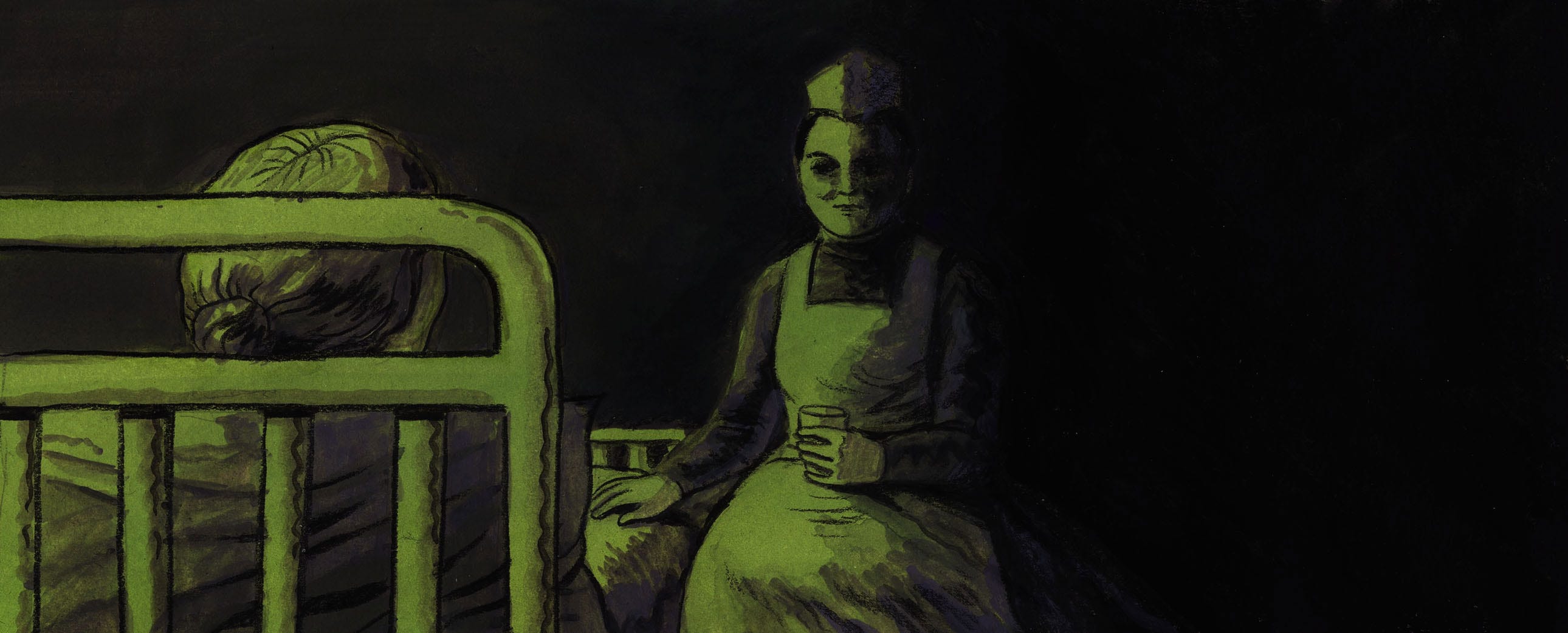The 19th-Century Nurse Who Was Secretly a Serial Killer
“Jolly Jane” Toppan overcame a miserable Dickensian childhood to become a medical professional patients adored. She was also slowly murdering them one by one.
Honora Kelley was 6 years old in 1863, the year her father surrendered her to the Boston Female Asylum. Her mother had died of tuberculosis, and that grief, along with the overt discrimination Irish immigrants faced in the United States, drove her father, Peter Kelley, a tailor, into poverty and alcoholism. Kelley signed over his parental rights to the orphanage, so that his daughter might be indentured, and, according to Harold Schechter’s book Fatal: The Poisonous Life of a Female Serial Killer, rescued from a “truly miserable” home.
There was a rumor that a few days afterward, “Kelley the Crack” (as he was widely known) became so exhausted by life that he sewed his own eyelids shut. This was most likely a fabrication — for how could anyone, even a tailor, sew both eyelids shut? — but the story haunted young Honora throughout her time in the orphanage. True or false, the tale survived because it served as an appropriate origin story for a woman who would go on to become the most notorious serial killer of her era. Her story, at least in part, is a tragic example of the worst-case scenario of the pressures put on marginalized women in the Victorian period.
At the orphanage, Honora Kelley was eager to please, whether through completing her chores and other training to become an indentured servant, or telling stories — lies — to the other orphans to win their affections. Her storytelling was discouraged, especially when she became indentured to a stern widow, Mrs. Ann C. Toppan, who chose her despite Honora being four years younger than most indentured girls. Mrs. Toppan, or “Auntie,” as she directed Honora to call her, taught the girl to hate herself. She was punished for telling stories, taught to strain out any Irish lilt in her voice, and made to change her name to the more English-sounding Jane Toppan, although according to the Boston Herald, she was not officially adopted.
She was allowed to continue living with the Toppans as a maid of all work past her 18th birthday, growing up in the shadow of Mrs. Toppan’s daughter, Elizabeth, who had all of the privilege and wealth that Jane herself desired. Elizabeth and Jane originally thought of themselves as sisters, until Auntie Toppan severely punished Jane for insinuating herself into their family. To drive home the point even postmortem, when Auntie Toppan died, Jane was tasked with organizing the funeral, even though she had been excluded from the will. Her resentment, according to Schechter, cemented.
Toppan stayed on as maid for Elizabeth and her husband, Oramel Brigham, for 10 years before getting up the courage to apply to nursing school. As in the orphanage, Toppan was a favorite among the doctors and with many of her patients. She anticipated their needs before they even realized they had any, and she always administered their treatments joyfully, which earned her the nickname “Jolly Jane.”
Her fellow nursing students, however, resented her. She was a genius, worked inhuman hours even by nursing standards, and everyone loved her. The other students tried to slander her, to get her fired by tattling that she’d spent her small wages on beer or missed required curfews. Though she was certainly guilty of these infractions, she twisted the accusations into slanderous gossip that resulted in the dismissal of two innocent nurses. Toppan’s glee at their firing shocked even her closest friends.
Some of her patients began to resent her as well, whispering to the doctors that they had overheard her saying that there was no point in keeping the elderly alive. The doctors dismissed their concerns, convinced that Toppan was a good nurse. If many of her patients died, well, it was an era when lots of patients did just that — expiring due to complications from experimental procedures, from sepsis or other common infections.
But Toppan was killing them too.


